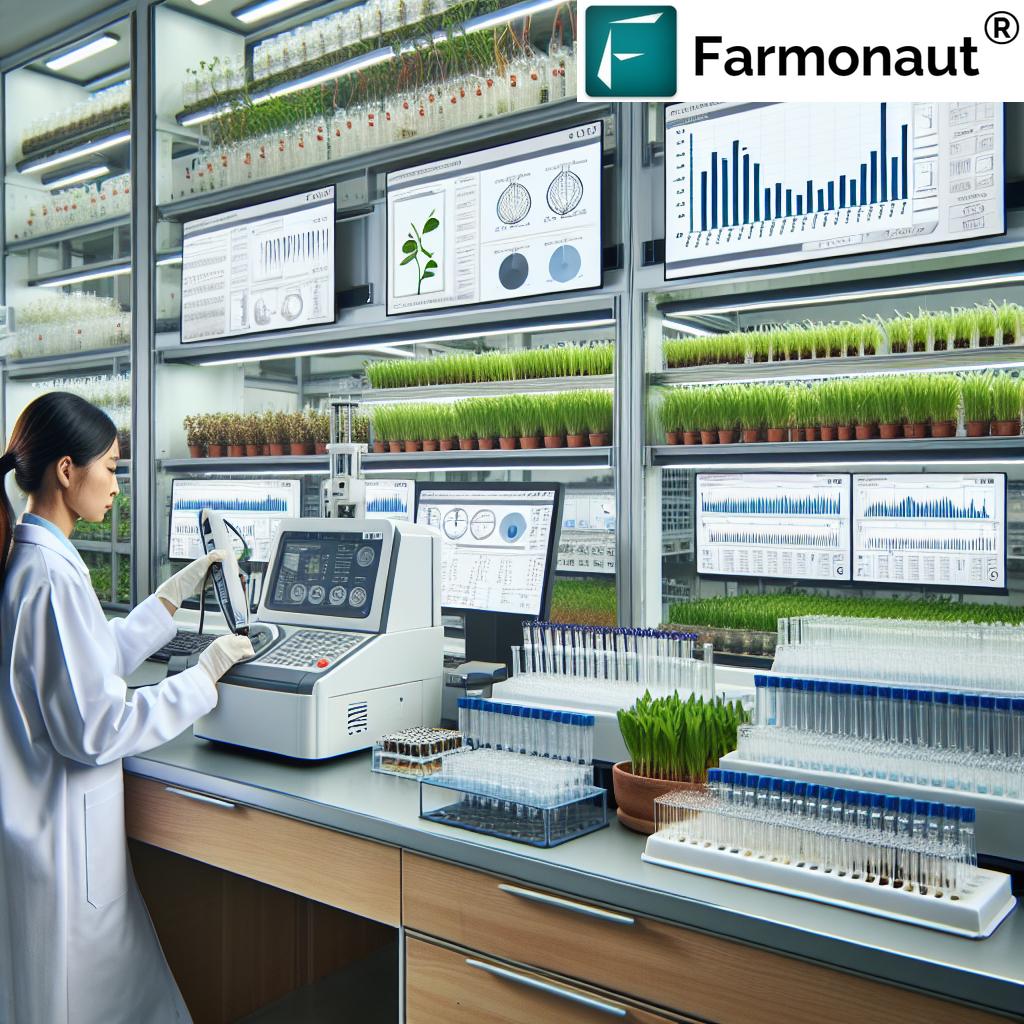Agricultural Equipment Technician Training: 7 Key Skills
“Modern agricultural equipment technicians master 7 key skills to maintain over 50 types of advanced farm machinery.”
Introduction: The Role of Agricultural Equipment Technicians
The agriculture industry has evolved rapidly in recent years, with a shift toward advanced machinery and smart technology. At the heart of this change are agricultural equipment technicians, professionals with the skills and expertise to ensure that all kinds of equipment — from tractors and harvesters to complex irrigation systems — operate efficiently and reliably.
As modern farming practices become increasingly mechanized and technologically advanced, the demand for skilled technicians has grown significantly. Their roles are now more varied and sophisticated, going beyond simple repair work to include diagnostic expertise, system optimization, and mastery of computerized and electronic components.
Whether you aspire to learn how to become a farm equipment mechanic or you’re already working in the field and seeking to expand your qualifications, understanding the core agricultural equipment technician training programs, key skills, and certifications is essential. In this comprehensive guide, we’ll explore the seven essential skills for success in this vital career and examine the educational pathways and opportunities available for technicians in modern agriculture.
“Over 80% of today’s agricultural equipment technicians require specialized certifications in high-tech machinery diagnostics and repair.”
Educational Pathways for Equipment Technicians
Aspiring agricultural equipment technicians usually begin their journey with a solid school education. Key subjects at the high school level include:
- Mathematics — necessary for measurements, calculations, and understanding complex machinery systems
- Technical shop courses & mechanical drawing — foster mechanical aptitude and an understanding of design principles
- Science classes like Earth Science — underpin knowledge of natural systems and the environment in which agricultural machinery operates
- Computer science — increasingly critical thanks to the growing integration of technology and electronic systems in modern equipment
After high school, postsecondary education becomes highly recommended for those seeking the strongest foundation in agricultural equipment maintenance. Two main routes are common:
- Vocational schools & community colleges — offer specialized courses and training in hydraulics, electrical and electronic systems, mechanics, farm power, engineering, and more.
- On-the-job internships or cooperative education programs — provide invaluable hands-on experience with real agricultural machinery for students.
The combination of academic knowledge and practical experience is the cornerstone of excellence for any future equipment technician.

Agricultural Technician Training Programs & Courses
Agricultural technician training programs are offered all over the world, typically at vocational schools, community colleges, and specialized agricultural colleges. These programs are designed to balance comprehensive theory with extensive practical work on tractors, harvesters, planting and irrigation systems, and a broad array of advanced agricultural equipment.
Core courses in these programs often include:
- General agriculture & farm power
- Mechanical principles: design, function, repair, and maintenance of equipment
- Hydraulics and electrical systems
- Practical engineering and diagnostic tools
- Agricultural equipment business methods
Many programs offer modules in real-time diagnostic systems, advanced electronic controls, and modern farming technology skills like GPS- or computer-guided machinery operation.
Use our app on any device to access up-to-date farm data, track equipment use, and coordinate agricultural machinery maintenance cycles for optimal performance.
Optimize your agricultural machinery, reduce downtime, and manage technician deployment across multiple locations with
Farmonaut’s Fleet Management tools. This feature empowers agribusinesses and technicians to monitor machinery movements, schedule service, and ensure every farm asset is maintained efficiently.
The 7 Key Skills for Agricultural Equipment Technicians
Excellence in farm machinery repair and maintenance of tractors and harvesters calls for a blend of technical and practical skills. Let’s delve into the 7 key skills every agricultural equipment technician needs for a successful career in today’s industry:
1. Mechanical Aptitude
-
Description:
A deep understanding of mechanical principles, the design, function, and repair of machinery and tools. -
Application:
Reading parts diagrams, identifying wear points in moving assemblies, and understanding how hydraulic systems operate in different machines, from seeders to harvesters. - Example: When a combine harvester’s hydraulic lift fails, technicians trace the mechanical sequence and determine whether the cause is a broken line, failed pump, or faulty control valve.
2. Diagnostic Abilities
-
Description:
Strong skills in identifying, troubleshooting, and diagnosing agricultural equipment issues across mechanical, electrical, and hydraulic systems. -
Application:
Using computerized diagnostic tools to quickly locate malfunctions in modern electronic control units, wiring harnesses, or sensor arrays. - Example: Isolating a GPS system failure in a tractor’s auto-steering unit by sequentially checking software, sensor alignment, and wiring connections.
3. Technical Proficiency With Modern Systems
-
Description:
Familiarity with modern diagnostic tools, computer systems, programmable controls, and the electronic components now standard in farm machinery. -
Application:
Running software upgrades, analyzing electronic error codes, and replacing or calibrating electronic sensors on advanced tractors or irrigation pumps. - Example: Updating firmware on smart sowing machines or diagnosing issues with remote telemetry on automated fertilization systems.
4. Attention to Detail
-
Description:
Meticulous attention to detail allows technicians to spot subtle issues that could lead to failure or inefficiency. -
Application:
Identifying hairline cracks in hydraulic hoses, checking for abnormal fuel pressure readings, or noticing small calibration errors in high-tech seed drills. - Example: Detecting early-stage bearing failure in a combine’s threshing drum, preventing a catastrophic breakdown during harvest.
5. Physical Stamina & Safety Awareness
-
Description:
Physical stamina to work in challenging environments, lift heavy parts, perform demanding tasks, and maintain rigorous safety standards. -
Application:
Performing repairs in extreme weather, crawling under machines, lifting transmissions — all while wearing protective gear and following safety protocols. - Example: Replacing a flat tire on a harvesting machine in the field, or rerouting hydraulic lines during peak planting season.
6. Communication Skills
-
Description:
The capacity to translate technical issues into clear explanations for farmers, machinery owners, and team members; crucial in training and collaborative work. -
Application:
Advising farm managers on machine maintenance, reporting potential upgrade requirements, and training new technicians in advanced systems. - Example: Producing detailed service logs that help farm operators schedule preventive maintenance.
7. Adaptability & Continuous Learning
-
Description:
As technology continually advances, technicians must be committed to ongoing education and learning new diagnostic techniques, repair methods, and the handling of emerging machinery. -
Application:
Attending workshops, taking manufacturer certification courses, and embracing new sensor and automation technologies. - Example: Learning to operate diagnostic equipment for electric tractors and staying current with AI-powered monitoring platform integrations.
Skill Overview & Impact Table for Agricultural Equipment Technicians
| Skill Name | Description | Application in Modern Equipment | Required Training / Certification | Estimated Impact on Efficiency |
|---|---|---|---|---|
| Mechanical Aptitude | Understanding design, function, and repair of machinery | Maintaining harvesters, tractors, planters, and mechanical systems | Technical diploma, hands-on practice | High |
| Diagnostic Abilities | Identifying and troubleshooting mechanical, electrical, hydraulic issues | Using diagnostic software on smart systems, resolving breakdowns | Manufacturer or EETC certification | High |
| Technical Proficiency | Familiarity with modern electronics, computer controls | Diagnosing faults in GPS, sensors, computer-operated machinery | Advanced technical courses, on-the-job training | High |
| Attention to Detail | Meticulously noticing faults and small discrepancies | Spotting microcracks, calibration errors in automated systems | Experience, quality assurance training | High |
| Physical Stamina & Safety | Ability to perform strenuous/manual tasks safely | Lifting, maneuvering, and field service | Physical training, OSHA certification (where applicable) | Medium |
| Communication Skills | Expressing technical issues, collaborating in teams | Reporting findings, training farm staff, explaining repair timelines | Communication modules, mentorship | Medium |
| Adaptability & Continuous Learning | Staying updated with industry advancements | Adopting new machinery, learning new software/hardware | Manufacturer & industry certification, workshops | High |
Enhance transparency and build trust in your agribusiness with
Farmonaut’s blockchain-based product traceability solutions. These tools ensure you and your clients can track agricultural goods from the field to the end consumer, vital for modern certifications and compliance.
Certification and Licensing for Agricultural Equipment Technicians
Certification is not always mandatory, but it’s increasingly essential for career growth in a highly competitive market. Recognized agricultural machinery certification programs demonstrate a technician’s proficiency in crucial areas like:
- Hydraulics certification — troubleshooting and repairing advanced fluid systems
- Engine repair and diagnostics
- Electrical systems — including diagnostic and automation controls
EETC (Equipment & Engine Training Council) and the Association of Equipment Manufacturers (AEM) are leading organizations in this space. Many farm machinery manufacturers offer proprietary certifications as well.
Why pursue certification?
- Recognition: Stand out as a skilled technician on the job market.
- Proof of expertise: Employers and agricultural businesses recognize certified professionals as having a higher standard of knowledge and skill.
- Career advancement: Qualify for higher pay, specialist roles, supervisory, or management tracks.
Integrate Farmonaut’s API into your enterprise solutions to bring satellite-based crop and machinery data into your operations, or check out our
detailed developer documentation
for full technical integration.

Career Outlook & Opportunities for Agriculture Equipment Technician
The future is bright for technicians specializing in agricultural equipment maintenance, repair, and diagnostics. According to the Bureau of Labor Statistics, median annual wages are approximately $57,838, with projected job growth of 4.07% over the next decade. This trend is fueled by the increasing complexity of farm machinery, the shift to smart agriculture, and the necessity for regular maintenance and machine optimization.
-
Employment Settings:
Equipment dealerships, authorized service centers, farm repair shops, large private farms, equipment manufacturing firms, and research organizations. -
Advancement:
Progress to technical trainer, lead service engineer, supervisor, or operations manager roles. -
Continuous professional development:
Attend workshops, seminars, and pursue additional certifications.
Special note: Many countries are providing incentives to upgrade farming infrastructure and technology, further enhancing job security and opening new avenues for skilled technicians.
For large agribusinesses managing fleets and multiple teams:
Farmonaut’s Large Scale Farm Management App provides a comprehensive platform to oversee all farm operations, coordinate with technicians, and monitor every field and piece of equipment — at scale!
How Farmonaut Empowers Agricultural Equipment Technicians
As a leading agricultural technology company, Farmonaut enables the modern equipment technician with innovative tools and data, closing the gap between traditional machinery repair and advanced precision agriculture. Here’s how our platform supports the agriculture equipment technician career:
-
Satellite-based Equipment & Crop Monitoring:
We offer precise remote sensing data, so technicians and agribusiness managers can track machinery location, plan optimal maintenance based on usage cycles or environmental stress, and quickly locate underperforming equipment for service. -
AI Advisory & Diagnostics:
Our AI-driven crop advisory system provides predictive maintenance intelligence, so you can schedule service before issues cause costly downtime or damage to advanced agricultural machinery. -
Blockchain-based Traceability:
For those in machinery and product logistics, we boost supply chain transparency — ensuring every repair, upgrade, or replacement is recorded securely for compliance and audit queries. -
Fleet & Resource Management:
Track multiple vehicles, schedule repairs across regions, and reduce unnecessary fuel and wear costs. -
Carbon Footprinting:
Our Carbon Footprinting solution helps agribusinesses and repair teams assess the environmental impact of machinery — an emerging compliance requirement for large-scale farming and food producers globally!
Frequently Asked Questions (FAQ)
Q1. What is the typical educational pathway for becoming an agricultural equipment technician?
Most technicians start with a high school diploma, focusing on mathematics, science, and technical shop subjects.
Beyond high school, vocational schools, community colleges, or specialized agricultural equipment technician programs offer advanced training in mechanical, hydraulic, and electronic systems.
Q2. Are certifications mandatory for agricultural equipment technicians?
Certifications are not always required but are highly recommended. Certifications (from organizations like the EETC or AEM) prove technical proficiency and enhance career prospects, especially as modern farm equipment becomes more technologically advanced.
Q3. How important is hands-on experience in this field?
Extremely important. Direct experience with tractors, harvesters, and other machinery builds problem-solving skills and confidence in diagnosing and repairing a wide range of issues in real-world scenarios.
Q4. What technological innovations should technicians be ready for?
GPS-guided equipment, AI-powered diagnostics, remote sensing systems, and automated machinery are shaping the future of agriculture. Staying current via workshops and continuous education is essential for technicians.
Q5. What are the main career opportunities for certified equipment technicians?
Opportunities include working at dealerships, farm service shops, large agribusinesses, government agencies, and moving into roles like technical trainer, service manager, or operations supervisor.
Conclusion: The Future of Agricultural Equipment Technicians
Agricultural equipment technicians play a vital role in ensuring the machinery that powers modern farming operates efficiently, reliably, and sustainably. As technology and innovation shape the agriculture industry’s future, the demand for professionals with deep skills in diagnostics, maintenance, repair, and systems optimization will only continue to grow.
Whether you are just starting out—exploring educational options, or are a seasoned expert seeking the latest certification in electronic systems or advanced hydraulics, a commitment to learning, and an adaptable mindset, are critical for ongoing career growth.
At Farmonaut, we are committed to empowering technicians and agribusinesses by bridging traditional agricultural expertise with smart technology and actionable data. Our platform offers affordable, scalable solutions designed to ensure that every piece of farm machinery operates at its best—for higher yields, fewer breakdowns, and a more sustainable farming world.
As agricultural equipment technician training and modern farming technology skills become ever more specialized, we believe this is a truly rewarding career path for those ready to combine hands-on practical work with a passion for high-tech agriculture.
Take your next step in agricultural equipment technician training — and help drive the technological evolution of modern agriculture!
















